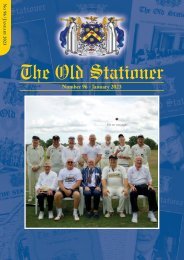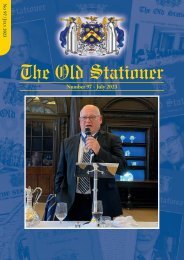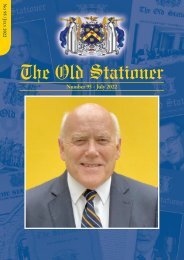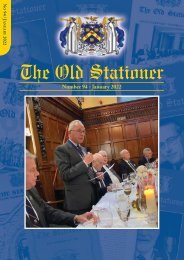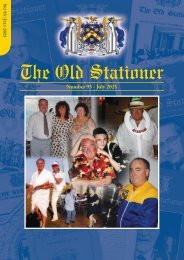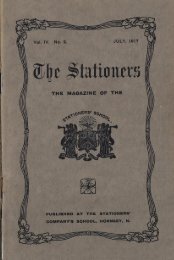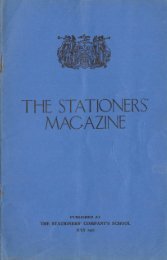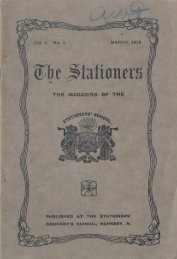OSAmag91
You also want an ePaper? Increase the reach of your titles
YUMPU automatically turns print PDFs into web optimized ePapers that Google loves.
T h e O l d S t a t i o n e r - N o 9 1
life over the ocean, settling in the Toronto
area. After a short break, Bob again
worked for Olivetti. Initially in Toronto
and then, as a national sales manager, in
four separate provinces in less than a
decade. Finally, in 1972, they returned to
Toronto, settling in the nearby township of
Uxbridge where they bought 10 acres of
hardwood brush on which they built their
dream home. This they surrounded with
beautiful gardens which were often
featured on the Uxbridge town tour.
Throughout his life Bob believed in
lifelong learning and was fascinated by
new ideas and developments. He learnt to
play the piano, played bridge, learnt
Spanish, went running, read a lot and
became a keen gardener. He even found
time, twice a day, to meditate and also
practiced yoga Perhaps therefore it was no
surprise when, in 1977, a change of career
beckoned and he spent some time studying
computing at York University in Toronto
after which he set up his own business, the
RJS Group, a supplier of cash registers and
point of sale systems.
Bob was passionate about living in
Uxbridge and keen on contributing to its
betterment. In 2000 he sold the business
and retired and then, in 2003 was elected
to his local council; serving as Mayor
between 2006 and 2010., a role in which
he excelled especially in the support of
small businesses in the town. Many years
before he had also developed an interest in
the natural environment and, in his own
words, become an avid environmentalist.
His time as Mayor of Uxbridge was
marked by his being the driving force in
gaining for the municipality “The Fields of
Uxbridge”, an area of some 70 acres and
which is now a multiuse outdoor
recreational area. He was also instrumental
in winning for the town the designation of
the Trail Capital of Canada with over 136
miles of managed trails within its borders.
Although passionate about business his
focus throughout life was on his family
and he taught his children to live honestly
and with integrity and to follow their
passions in life believing that in doing so
success would follow.
In June 2019 Bob was diagnosed with
pancreatic cancer. He chose quality of life
as opposed to quantity and decided to
forgo any treatment. At a meeting of the
Council on the 23rd of September he was
honoured by the naming of one of the
winding paths in the Countryside Preserve
“The Mayor Bob Shepherd Woodland
Trail.” In thanking the Council, he said he
could not think of a better way to be
remembered. Bob had registered for
assisted dying and in his last moments, in
true Bob Shepherd style, asked his son to
check that there wasn’t anything anyone
present needed to ask him. He just needed
to be sure there was no unfinished business.
Bob passed away peacefully on the 23rd
October, in the presence of his family,
leaving his wife Ann, four children, fifteen
grandchildren and four great grandchildren.
Bob stood again [unsuccessfully] for leader
of the council in, I believe, 2013, All three
candidates were allowed a two minute
video presentation. It occurs that some of
Bob's contemporaries might like to see and
hear him again. Can be found at:
www.durhamregion.com/video/4865497/
Lucien Perring
I'd like to acknowledge the help I received from Bob's
daughter, Lynda Sauder, in the preparation of his
obituary.
Harold Perry
1925-2020
Eulogy by Richard Perry
Harold Ernest Perry was born 7th July
1925 in North Middlesex Hospital to
Father Ernie, a Commercial Traveller for
Provisions, and mother, Lily, whose family,
the Higgins’, ran the Bedford Arms pub in
Finsbury Park. Harold was joined by
younger siblings, Madge, who sadly passed
away in 2019, and later Barry, who survives
and is living in Ireland.
The family lived in Wood Green and had
quite a sporty background. Mum Lily was
a keen swimmer and the family were
stalwarts of the local Tennis Club. Young
Harold was a keen swimmer and cyclist
and only recently pointed out to us the
Rookery Café near Welham Green,
Hatfield, to which, as a 14-year-old, he
and his cycling club friends would ride on
a Sunday morning from Wood Green.
Harold attended Noel Park Primary
School where his 1932 school report noted,
as a July baby, “a good start from our
youngest boy. He will improve”!!
He moved onto the Stationers' Company
School in Hornsey, with which, although
no longer in existence, he retained contact
in his later years through the Old Stationers
Association. He was their President in
1971, and latterly, a member of the
Stationers Company and the Stationers
Company Masonic Lodge. His academic
progress may not have lived up to the
hopes of his earlier school report as his
December 1940 school report shows 18
detentions during the term and the
summary comment: “Is generally weak and
making no serious efforts to remedy it.”
In September 1939, at age 14, with the
outbreak of War, he was amongst 280
pupils from Stationers to be evacuated to
Wisbech in Cambridgeshire, from where
the school continued to operate. We do
not know much about this period other
than he was separated from younger
siblings Madge and Barry who were
evacuated to Wales.
In 1941 he left Stationers to join a West
End firm of Estate Agents, Lane Savill &
Co, to train as a surveyor. However, by
1943 (at age 18), he left Lane Savill to
volunteer for the Fleet Air Arm. His
reference from Lane Savill said that “he
has proved himself a pupil of more than
usual ability, having both a pleasing and
reliable personality and one showing a
keen sense of responsibility”.
This reference shows how quickly the
young adult Harold had grown up since
his school days and was becoming the
much-loved man so recognisable to us all.
Harold’s war service was varied, training
with the Fleet Air Arm in the USA and
Canada, albeit failing to acquire his pilot’s
wings; being transferred to the Army and
then posted to the Indian Military
Academy. Commissioned in 1945, he
served with the Indian Army in India and
Java, returning in 1947 to join the Royal
Fusiliers in Britain, before being demobbed
in May 1948 with the rank of Lieutenant.
During this last posting, Harold was based
at camp in Meriden, Warwickshire, when,
at a village hall dance, he met future wife,
Vera. Harold and Vera were married at the
Parish Church of Temple Balsall on 3
January 1948 and made home in
Warwickshire. In 1953, son Michael was
born, followed in 1957 by Richard.
Harold had resumed his studies as a
surveyor after the war and qualified as an
Associate of the Royal Institute of
Chartered Surveyors in 1956, joining the
Birmingham Quantity Surveying practice
of Silk & Frazier where he became a
partner in 1960. He became a full fellow of
the RICS in 1966.
In 1963, as a native Londoner, Harold was
chosen to lead the expansion of Silk &
Frazier with the opening of a new London
office and after much long-distance house
hunting, he and Vera agreed to buy a
property still under construction in
41



